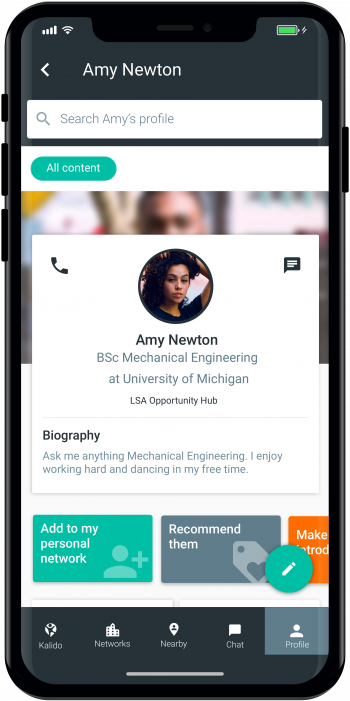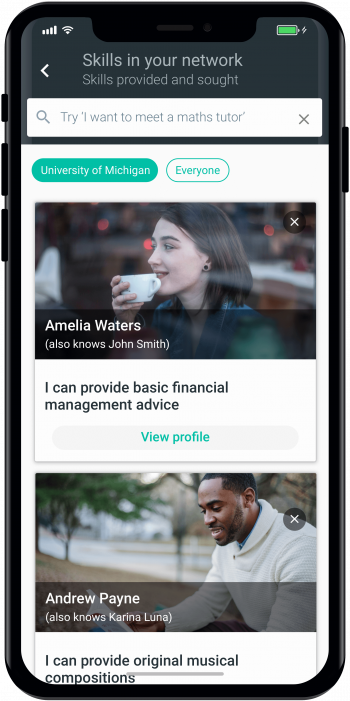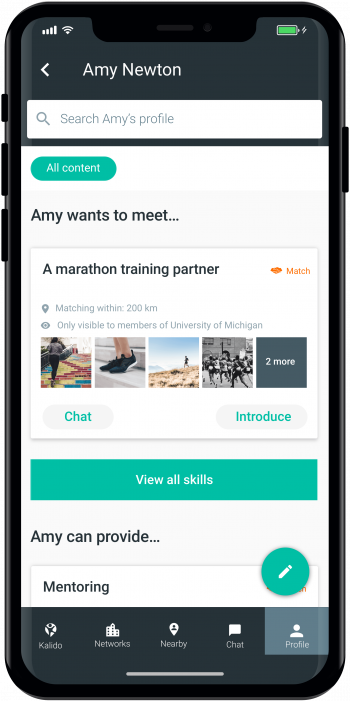As the saying goes, birds of a feather flock together. Extend that idiom into the working world, and you might say: birds of the same flock work better together. In this case, we’re referring to alumni from your school. Whether you’re looking for a collaborator for a project, a professor to join an academic department, or a mentor to guide your career, it makes sense to seek out people who’ve attended your institution. Here’s why:
1) Alumni are easy to find

Many alumni stay in the area they graduate in, regardless of where they originally came from. This makes sense as bonds of friendship are formed, professional contacts are made, and first jobs are landed during those school years. So, staying in the area gives alumni a wide support network.
This is great news for you, because when you’re looking for someone to work with, you won’t have to look far. And instead of relying on chance meetings at the local grocery store, you can easily find alumni past and present through Kalido networks. Kalido networks can be created for any institution, graduating year, subject matter, or any number of smaller group of like-minded people. As a member of a network, you’ll be able to see your fellow network members’ current skills, interests, and general location. You’ll also be notified if anyone happens to be around (that schoolmate you regrettably lost touch with could be at a café right next door). You’ll also be able to call and chat to each other for free from the app.
Instead of paying commission to recruiters, or wasting time researching people online, you could simply scroll through your network members and find a fellow alum nearby to start working with immediately.
2) You know what their qualification means in terms of quality

There’s a reason you chose to attend or work at the institution you did. And one of the primary factors is the quality of the education there. When another person has also attended that institution, you know they’re not a graduate of some fly-by-night school, whose degree or diploma isn’t worth the paper it’s printed on.
It may seem unfair to judge a person’s skills by their educational background, but it’s standard practice in the hiring world. Certain schools are renowned for producing candidates sought after by employers. Employability is also one of the factors used when ranking schools in international tables. This indicates that the education provided by some schools is more valued in the working world than others. When you’re looking for someone to hire, be hired by, or partner with, finding a person whose qualification you know and respect makes it easier to trust their professional opinion.
3) You have shared experiences

You may not have studied the same field, been on the same campus, or graduated in the same year, but you’ll both be familiar with your school’s institutional memory and personality. Your school may have a history of liberal politics, for example. So, regardless of era or campus, student demonstrations may have been part and parcel of your university experience. Or perhaps your school has a famous rivalry against another institution, and students are notorious for their mutual pranking. Professors also tend to stay on for many generations, and become recognisable targets for students’ admiration or good-natured teasing.
Having attended the same school, you’ll be able to relate to each other on a much more personal level. In addition to work discussions, you can bond over shared nostalgia over the fabulously cheap and delicious pitas served on East Campus. You might even be inspired to invite them over for a Mediterranean themed lunch, in honour of your shared love of hummus.
4) You probably know the same people

One of the best indicators of whether you’ll get along with someone is whether those nearest and dearest to you get along with them. If someone you know and trust has given their approval, that’s one of the best endorsements of the person’s personality, skill, or work ethic. Attending the same institution vastly increases the chance that you’ll know the same people. This means you can ask common contacts for their opinion on someone, as a filter before you commit to working with them. It also means that you can ask common contacts for an introduction, to help break the ice.
Again, Kalido networks come in handy by letting you see a person’s contacts, including ones you share. This means you won’t be relying on chance conversations to surface a person’s connections. You can also request an introduction straight from the app. Or use the chat and call features to grill your friends about your new acquaintance. You’ll find out ten times more about a person from talking to people who actually know them, than from the most elaborate CV.
5) They can introduce you to other alumni

All the benefits listed above will be multiplied exponentially when you know more alumni. By asking one person to introduce you to others, you’ll suddenly break into whole new circles. And having your original alum friend introduce you means you’ll come recommended, making your acceptance into these tight-knit and often extremely powerful groups that much easier. The opportunities this creates are staggering.
Individuals in higher education also often attend more than one institution. A person may decide on one school for their undergraduate, and another for their postgraduate programme. Or they may enrol in a summer course to enhance their skills. Regardless of the actual circumstances, both schools are usually equitable in terms of education and prestige. This means that one individual could potentially introduce you to alumni from several different institutions – all as valuable as alumni from your own school. One right connection could help you find hundreds of new contacts. In terms of networking, there’s no better way to make quality professional and personal connections.
Attending university should always be about gaining experience, not just getting an education. Part of that experience is making friends, and finding people who can help you down the road. Instead of letting these opportunities end with the completion of your programme, work with other alumni, and reap the benefits of attending your school decades after graduation.

